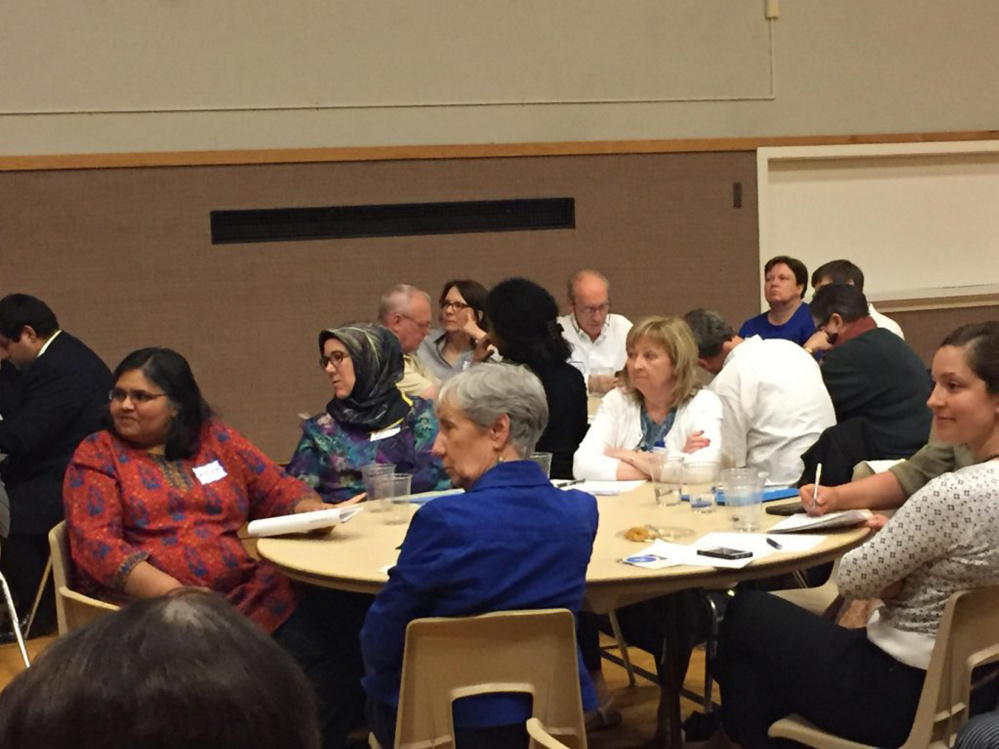When Symi Rom-Rymer heard about a family in Fairfax County, Virginia that found their home broken into and “F– Muslims” scrawled on their walls, she wished she could do something to help.
When it was a nearby Jewish Community Center and then a church vandalized with swastikas, again she wondered how she might fight the hate.
Now, Rom-Rymer is organizing a team of volunteers who will be prepared to spring into action when a religiously or racially motivated hate crime occurs in the Washington area.
“Whenever there is an incident, our response is going to be in person,” said Rom-Rymer, who works as a community organizer for the Interfaith Conference of Metropolitan Washington.
She envisions the team’s aid as direct and personal. “If a woman who is wearing a hijab feels unsafe walking from her car to her mosque, she or someone in her community can contact us and say, ‘I feel unsafe. Can you send someone out?’ And we would go.”
More than 50 people from different faiths, including Bahai and Zoroastrianism, gathered in a Mormon church’s basketball gym in Chevy Chase, Maryland, last week for the first meeting for people interested in learning about the new rapid-response team.
The model for the team – formally named the Washington Interfaith Response and Outreach Coalition, or WIROC – relies on churches, synagogues, mosques and other communities signing up as “solidarity congregations.”
Each congregation will designate volunteers who will be trained for the rapid-response team. Individuals who don’t belong to the congregations can sign up on their own.
When the network gets word of a hate crime, a trained first responder will contact the victim to provide coaching, such as advice on how to report the crime to law enforcement, and to ask what sort of help the victim needs from the community.
Then WIROC will mobilize the whole network to help in whatever way the victim needs, such as cleaning up graffiti or replacing stolen or damaged property.
Rom-Rymer also wants to set up similar networks of students at Washington area universities, who can respond to hate crimes on their campuses.
Rabbi Gerry Serotta, executive director of the Interfaith Conference, said he hopes 90 percent of the network’s activity will be educational efforts aimed at reducing religious ignorance to prevent bigotry, rather than cleaning up after a crime.
But after several hate crimes affecting congregations in the Washington area in recent months, and a large spike in bias incidents nationwide against Muslims and Jews, Serotta said, “We fear that that’s part of the landscape now.”
“Some people are acting out in these horrendous ways,” he said.
“It’s mostly minority communities, most of them people of color … We’re getting calls right and left saying what can I do to help my Muslim neighbors, my Sikh neighbors, my Hindu neighbors?”
Copy the Story LinkSend questions/comments to the editors.



Success. Please wait for the page to reload. If the page does not reload within 5 seconds, please refresh the page.
Enter your email and password to access comments.
Hi, to comment on stories you must . This profile is in addition to your subscription and website login.
Already have a commenting profile? .
Invalid username/password.
Please check your email to confirm and complete your registration.
Only subscribers are eligible to post comments. Please subscribe or login first for digital access. Here’s why.
Use the form below to reset your password. When you've submitted your account email, we will send an email with a reset code.